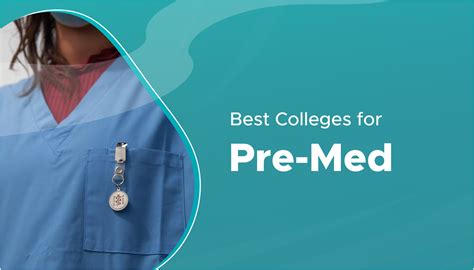Embark on Your Medical Journey with Excellence

For aspiring physicians, choosing the right pre-medicine program is crucial. Universities with established science departments, experienced faculty, and a supportive environment can nurture your academic growth and prepare you for the rigors of medical school.
Top-Ranked Pre-Medicine Programs
According to the U.S. News & World Report, the following universities offer exceptional pre-medicine programs:
- Johns Hopkins University (Baltimore, Maryland)
- University of Pennsylvania (Philadelphia, Pennsylvania)
- Harvard University (Cambridge, Massachusetts)
- Duke University (Durham, North Carolina)
- Washington University in St. Louis (St. Louis, Missouri)
- Stanford University (Stanford, California)
- Yale University (New Haven, Connecticut)
- Rice University (Houston, Texas)
- Northwestern University (Evanston, Illinois)
- University of Notre Dame (Notre Dame, Indiana)
Factors to Consider When Choosing a Pre-Medicine Program
- Reputation and Rankings: Look for programs with a strong track record of preparing students for medical school. National rankings provide an objective measure of quality.
- Faculty Expertise: Assess the faculty’s research, teaching experience, and mentorship opportunities. Renowned scholars can provide invaluable guidance and support.
- Academic Rigor: Ensure that the program provides a challenging curriculum that will foster your critical thinking, problem-solving, and analytical skills.
- Research Opportunities: Seek programs that offer undergraduate research experiences. These opportunities allow you to gain hands-on experience in biomedical research, enhance your scientific knowledge, and develop essential research skills.
- Pre-Health Advising and Support: Choose a program with a dedicated pre-health advising staff that provides comprehensive support, including course selection, MCAT preparation, and medical school applications.
- Location and Culture: Consider the location and culture of the university. A campus with a vibrant pre-health community and access to hospitals and research centers can enrich your experience.
Pre-Medical Coursework
Successful pre-medicine programs typically require students to complete the following core coursework:
- Biology (with lab)
- Chemistry (with lab)
- Physics (with lab)
- Mathematics (calculus and statistics)
- English Composition and Literature
- Humanities and Social Sciences
In addition to these core subjects, many programs offer specialized pre-medicine tracks or minors that provide additional exposure to biomedical sciences.
Applying to Pre-Medicine Programs
Admissions to top pre-medicine programs are highly competitive. The following tips can improve your chances of acceptance:
- Maintain a Strong Academic Record: Aim for a high GPA in all your coursework, especially in science and mathematics.
- Excel on Standardized Tests: Prepare thoroughly for the SAT or ACT and the MCAT (Medical College Admission Test).
- Gain Extracurricular Experience: Participate in extracurricular activities that demonstrate your interest in medicine, such as volunteering at hospitals or shadowing physicians.
- Craft a Compelling Personal Statement: Outline your motivation for pursuing medicine, highlight your relevant experiences, and articulate your goals.
- Seek Letters of Recommendation: Request letters of recommendation from professors, mentors, or others who can attest to your academic abilities and character.
Beyond the Classroom: Enhancing Your Pre-Medical Experience
- Participate in Research: Engage in undergraduate research projects to gain practical experience, develop your critical thinking skills, and establish research connections.
- Volunteer in Healthcare Settings: Clinically-relevant volunteer work provides hands-on patient care experience and builds your understanding of healthcare systems.
- Join Pre-Health Clubs and Organizations: Connect with fellow pre-medical students, attend workshops, and participate in events that enhance your knowledge and skills.
- Build a Support System: Surround yourself with mentors, friends, and family who support your academic and career goals.
- Take Care of Your Mental and Physical Health: Maintain a balanced lifestyle and prioritize your well-being. Medical school can be demanding, and it is essential to develop self-care strategies.
Conclusion
Choosing the best pre-medicine program is an important step towards achieving your medical aspirations. By carefully considering the factors outlined above, you can identify the university that will provide you with the academic, experiential, and supportive foundation necessary for success in medical school and beyond.
Frequently Asked Questions
Q: What is the best pre-medicine major?
A: There is no single “best” major for pre-medicine. However, disciplines such as biology, chemistry, and physics provide a strong foundation for medical school.
Q: How competitive are pre-medicine programs?
A: Admissions to top pre-medicine programs are altamente competitive. Applicants should maintain a high GPA, excel on standardized tests, and engage in extracurricular activities that demonstrate their interest in medicine.
Q: What extracurricular activities are recommended for pre-medicine students?
A: Volunteering in healthcare settings, participating in research projects, and joining pre-health clubs and organizations are all recommended extracurricular activities for pre-medicine students.
Q: What is the MCAT?
A: The MCAT is the Medical College Admission Test, which is required for admission to medical school. The MCAT assesses students’ knowledge of the natural sciences, critical reasoning skills, and writing ability.
Q: How can I improve my chances of getting into medical school?
A: Maintaining a strong academic record, excelling on standardized tests, gaining relevant extracurricular experience, and seeking mentorship and support can all improve your chances of getting into medical school.
